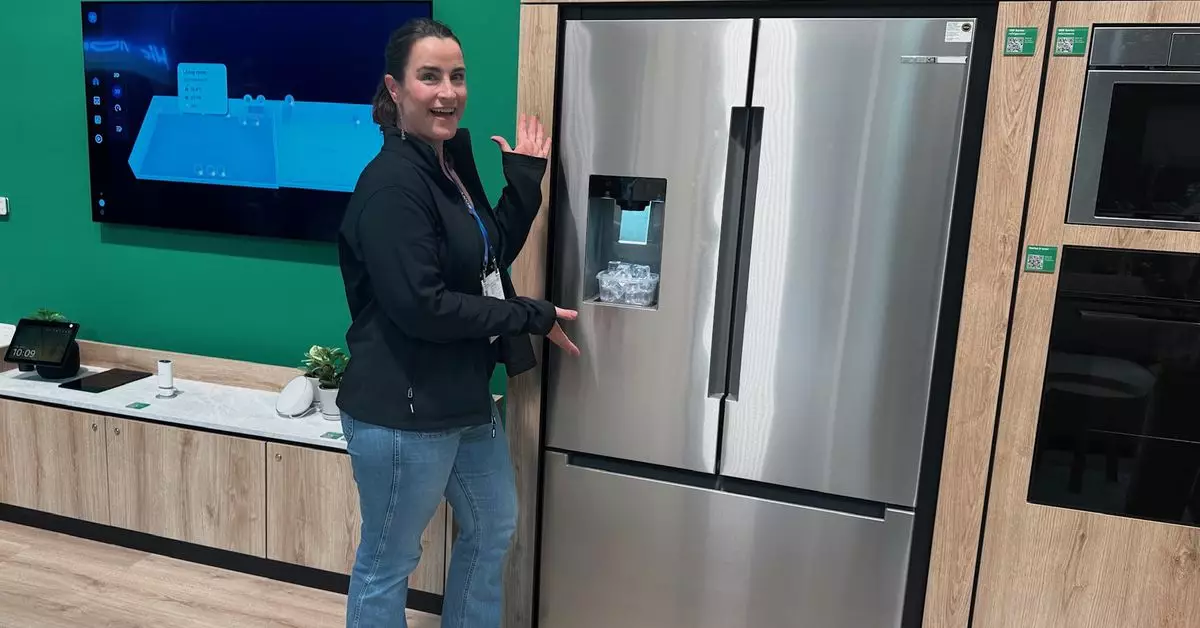In a rapidly evolving landscape of smart home technology, Bosch has made a notable entry with its first Matter-enabled appliance, the 100 Series French Door Bottom Mount Refrigerator. Introduced at CES, this refrigerator not only signifies Bosch’s commitment to innovation but also showcases the potential of Matter as a unifying standard for smart devices.
Launched in November and set for wider availability in the US this spring, this sleek refrigerator is priced at approximately $2,500. What sets it apart is not just its aesthetic appeal but its advanced capabilities supported by a dedicated chip designed for Matter—a groundbreaking interoperability standard crafted by industry giants including Apple, Amazon, Google, and Samsung. This integration allows for a more cohesive network of smart devices, vastly improving user experience.
The significance of Matter cannot be understated. Unlike existing smart home technologies that often rely on cloud connectivity, Matter facilitates local communication between devices. This results in faster response times, increased security, and enhanced reliability. For instance, if the refrigerator door is left ajar, users can receive real-time alerts through their smart home ecosystems, making household management more efficient.
Eelco Lammertink, a spokesperson for BSH—Bosch’s parent company—indicated that the 100 Series is just a starting point. Following this debut, BSH has ambitious plans to extend Matter compatibility across its appliance lines, including Siemens and Thermador products, initiating with refrigerators and expanding to other appliances by 2026. This strategy not only reinforces Bosch’s position in the market but also underscores the importance of adaptability in the consumer appliance sector.
As consumers increasingly expect seamless interaction among smart devices, the energy management features slated for the 100 Series refrigerator are particularly noteworthy. With built-in energy reporting capabilities, users can integrate the appliance into a holistic energy management system, promoting sustainability and energy efficiency within the home. Unfortunately, BSH has clarified that existing appliances will not receive Matter updates—a setback for some consumers who own earlier models, reflecting the complexities of retrofitting established technology.
Currently, the appliance landscape under Matter’s umbrella is limited, with Samsung SmartThings and Home Assistant already on board, and Amazon set to integrate support soon. However, the status of Google Home and Apple Home remains uncertain. The need for broad interoperability means that manufacturers and platform developers must collaborate closely to expand the ecosystem. The potential for various devices—ranging from kitchen appliances to lighting and security systems—to communicate effectively under this standard is a tantalizing prospect for consumers, creating a truly interconnected living environment.
The main thrust of Matter as a connectivity protocol is to alleviate consumer frustration associated with device compatibility. Today’s smart homes are often a patchwork quilt of devices that can be finicky or difficult to connect. By establishing a common framework, Matter aims to streamline the setup process and user experience, fostering a more user-friendly environment.
While Bosch is taking significant steps forward, the broader challenge lies in maintaining security and privacy within this expanding digital landscape. Consumers are rightly concerned about data protection, particularly as appliances become more connected. Bosch’s commitment to secure local communication is a reassuring aspect, yet vigilance is essential to ensure that expanded capabilities do not inadvertently open doors to vulnerabilities.
Bosch’s introduction of the Matter-enabled 100 Series refrigerator is a pivotal moment in the evolution of smart home technology. As companies like Bosch lead the charge toward a more integrated and user-friendly home environment, consumers can eagerly anticipate the full potential of Matter. With improved communication between devices, enhanced energy management features, and robust security measures, the future of smart home appliances looks brighter than ever. As we move forward, the success of these innovations will depend on manufacturer commitments and consumer adoption, promising a new era of convenience and efficiency in our daily lives.


Leave a Reply